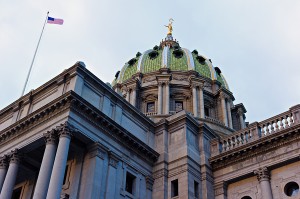PA open-government advocates push to end executive session abuse

By Andrew Staub | PA Independent
Most community gadflies and municipal reporters have plenty of stories about local elected officials improperly retreating behind closed doors to discuss business in transparency-killing executive sessions.
“It’s pretty universal. I have no trouble finding people to say, “Yup, I know exactly what you’re talking about,’ ” said state Rep. Rick Saccone, an Allegheny County Republican who has set out to narrow the circumstances in which the officials can gather out of public view.
Saccone has introduced legislation to amend the state’s open-meetings law in an attempt to curb abuse of executive sessions. His bill would narrow the reasons for them and require the closed meetings be recorded so complaints can be verified in court.
STAY WHERE WE CAN SEE YOU: A state lawmaker is pushing for changes to Pennsylvania’s open-meetings law to stop officials from abusing executive sessions.
Melissa Melewsky, media law counsel with the Pennsylvania NewsMedia Association, said her organization is happy about the reform efforts. It’s evident there’s a problem because half of the 2,000 calls the trade group’s legal hotline receives each year deals with the state’s sunshine and right-to-know laws, she said.
The pace of complaints isn’t slowing down over time, either, Melewsky said while testifying during a public hearing at the state House’s State Government Committee. Courts also offer a simple fix for violations, allowing offending municipalities to “cure” a defective meeting by simply having a re-do.
“It’s very difficult to enforce the Sunshine Act, and anything, any measure that you could take that would help enforcement actions would be a benefit to the public,” Melewsky said.
Under current law, agencies can hold executive sessions to talk about personnel matters, to discuss potential or pending litigation or to consider the purchasing or lease of land. They can also discuss labor relations and arbitration issues and business that could violate a lawful privilege of information and confidentiality behind closed doors.
Higher-education agencies can also hold executive sessions to discuss academic standing or admissions issues.
Saccone’s bill would carve out another exemption to discuss plans related to security and emergency preparedness, though he said that’s to stop officials from using public safety as a broad excuse to go into an executive session. It also would require that personnel matters involve a specific individual — another way to thwart going behind doors to discuss broad employment matters.
The bill would also require that agencies consult with their solicitor or legal counsel before holding an executive session. Agency members who report a possible violation of the law would be immune from criminal liability under Saccone’s proposal.
While Melewsky and Kim McNally de Bourbon, executive director of the Pennsylvania Freedom of Information Coalition, advocated for more sweeping changes to the open-meetings law, Elam Herr, assistant executive director of the Pennsylvania State Association of Township Supervisors, questioned the need to change the current rules.
Herr called Saccone’s proposal an unfunded mandate that could wreak havoc for local governments that must often handle employment issues. For now, the law provides a “broad umbrella” for those types of discussions, he said.
“We believe that this is the only way to allow a board to function without adding to the risk of lawsuits and the loss of public dollars,” he said.
Saccone said those concerns are “red herrings.” The state’s Right-To-Know Law already precludes the release of minutes from executive sessions and his legislation wouldn’t require officials to name the subject of personnel discussions, he said.
Wednesday’s hearing provided ample anecdotes about misuse and problems that come with the use of executive sessions.
Joseph Strauch, a member of the Lackawanna Trail School Board, said the sessions’ secrecy creates an environment where vulgar language can be used to bully others.
The problems in Lackawanna Trail run far deeper than just colorful language. Last year, a state auditor general report found the board routinely violated the Sunshine Act as it pertains to executive sessions.
Meeting minutes didn’t note that executive sessions were held or the reason for the closed-door gatherings. The board also gathered before the scheduled start of open meetings to meet in executive session.
Discussion topics included pay raises, managing the schools lunch program and even interview candidates to fill board vacancies, Strauch said. Violations continue today, he said, adding that Saccone’s bill could help restore faith that citizens have a say over their government’s actions.
“One of the problems I have observed at executive session is a culture of doing business in private, except that which must be done in public,” Strauch said.
The Lock Haven Express newspaper has investigated the use of executive sessions. In one instance, an attorney laughed at a reporter who challenged a board’s wish to go behind closed doors, publisher Bob Rolley told the committee.
“I’m here to tell you there a lot of violations,” he said. “I’m here to tell you that there are local elected government officials out there who could give a crap. I’m being honest. That’s what we found.”
Andrew Staub is a reporter for PA Independent and can be reached at Andrew@PAIndependent.com. Follow @PAIndependent on Twitter for more.
The post PA open-government advocates push to end executive session abuse appeared first on Watchdog.org.







